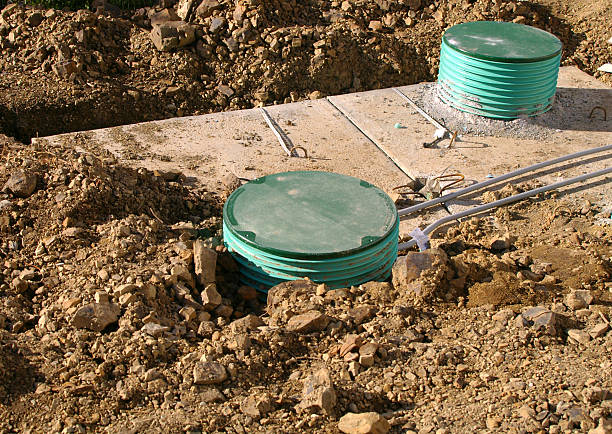When building your ideal home or purchasing an existing property, it becomes imperative to comprehend the specific wastewater drainage and treatment system required or already in place. These systems play a pivotal role in ensuring appropriate wastewater disposal from toilets, sinks, and other sources.
Broadly categorized, there are two types of systems: sewer and septic. The selection of a suitable system often hinges on the regulations and zoning practices of the local municipality where the property is situated. Homes are typically connected to areas equipped with a sewer system.
On the other hand, a septic system grants homeowners the liberty to reside in rural regions where no sewer system is available or where the costs of connecting to one prove prohibitive. Despite serving the common purpose of wastewater drainage and treatment, sewer and septic systems function differently and cater to varying scales. So, what sets apart a sewer system from a septic system?
What is a Sewer System?
A sewer system is an intricate underground network of pipes and structures carefully designed to collect, convey, and treat wastewater from residential, commercial, and industrial sources in densely populated urban areas and some suburban regions.
This highly efficient system dutifully transports wastewater from toilets, sinks, showers, and other sources, channeling it toward a designated wastewater treatment plant. At the treatment plant, a series of purification processes are employed to eliminate harmful substances and impurities, ensuring the wastewater is safe before being released into the environment.
Sewer systems play a pivotal role in safeguarding public health, preserving precious water sources, and maintaining proper sanitation for communities. For properties that are connected to the sewer line, the responsibility of maintaining and addressing issues related to the sewer system itself lies with the utility department. As a result, individual homeowners are relieved of the burden of managing wastewater treatment independently.
What is a Septic System?
A septic system is a self-contained wastewater treatment solution designed for individual properties, particularly in rural areas where access to a sewer system is unavailable or cost-prohibitive. Comprising a buried septic tank, the system receives household wastewater. Within the tank, solid waste settles at the bottom, forming sludge, while lighter substances like grease float to the top as scum. The partially treated wastewater, known as effluent, remains in the tank for further decomposition of organic matter.
Once treated within the septic tank, the effluent is discharged into a drain field, undergoing additional filtration and purification as it percolates through the soil. Homeowners with septic systems are responsible for regular maintenance and inspections to ensure the system operates efficiently and to prevent issues such as backups or contamination.
How to Determine the Appropriate Wastewater System: Septic or Sewer?
External factors often influence the decision between a septic or sewer system. A septic tank may be the only viable option for those residing in rural areas. Conversely, properties located in busy cities or suburbs are likely to already have a connection to the sewer.
Despite those general scenarios, exceptions do not exist.in some cases, a septic system becomes necessary when a public sewer is accessible, but the property is too distant from the main line of connection. Similarly, if the sewer is operating at full capacity, property owners may be required to install a septic system until the public utility can accommodate additional connections.
Factors to Consider When Deciding Between Septic and Sewer Systems
- Location: As mentioned earlier, the property’s location is crucial. Rural areas with no access to a sewer system typically require a septic system, while urban and suburban properties are more likely to have access to a sewer system.
- Cost: The cost of installation and maintenance is another significant consideration. Septic systems might be more cost-effective for properties in remote areas, whereas connecting to a sewer system can be expensive in certain cases.
- Regulations: Local regulations and zoning practices may dictate the type of system allowed in specific areas. Property owners should check with the local municipality to ensure compliance with regulations.
- Environmental Impact: The environmental impact of each system should be evaluated. With their centralized treatment plants, sewer systems can have a broader impact on water treatment and sanitation for larger communities. On the other hand, a properly maintained septic system can be environmentally friendly and sustainable.
- Maintenance Responsibility: Homeowners should consider the maintenance responsibilities associated with each system. The utility department typically handles maintenance with a sewer system, while septic system owners are responsible for regular upkeep and inspections.
Conclusion
While both sewer and septic systems serve the essential function of wastewater disposal, they operate on fundamentally different principles and have unique advantages and disadvantages. Sewer systems are managed by municipalities, with waste flowing to centralized treatment plants, while septic systems treat waste on-site in individual properties, providing control and independence.
For homeowners utilizing a septic system, its maintenance and longevity are crucial. This is where VI REEL Septic and Excavations comes in, offering top-notch septic installation, inspection, repair, and maintenance services. Their team of experienced professionals ensures your septic system operates efficiently and reliably. Don’t let septic issues disrupt your peace of mind; contact VI REEL Septic and Excavations today for all your septic system needs.


